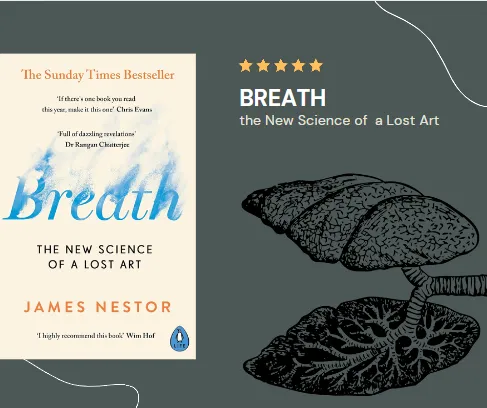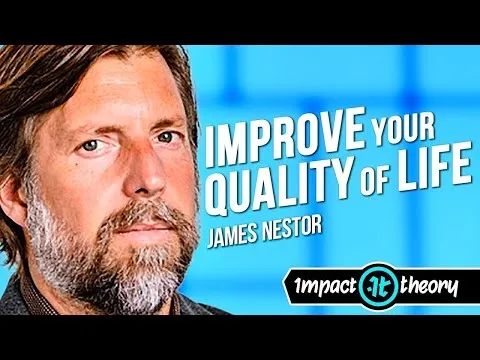
Why am I suggesting this is essential reading for everyone? Because everyone breaths. Every one has lungs.
Start this book, and you'll be aware of every breath you take, and how you take them.
And if you have crooked teeth, sleep apnoa, breath through the mouth, have asthma or other lung conditions, or are concerned about your health or longevity, you'll find this absolutely essential reading like I did.
I've always had a really complicated relationship with the breath, being asthmatic. I'm guilty of shallow breathing as asthmatics are. Reading this book gives me renewed determination to make breath my focus for the rest of my life.
Nestor begins the book with his own issues with sleep apnoa and snoring. The issue, argued a specialist, was that he was a mouth breather, and that needed fixing, as it's incredibly detrimental to our health. It wasn't entirely his fault, and it wasn't even about genetics. Our small mouths and narrow airways have been a product of modern diets and have only become that way in the last three hundred years, and was always worse in the rich, as they could afford processed foods. Crazy right? The more our ancestors cooked and mashed and strained and preserved our food, the worse our health became, and the more crooked our teeth and more closed our airways. And removing teeth isn't a fix - in fact, it makes the problem worse.
So that's a fascinating enough start. He moves onto exploration of what he calls the pulmonauts - people who have researched and experimented and practiced breathwork who have had great successes in healing people that had really terrible health problems. Many of these have been forgotten, but in the last few years, there's been a massive amount of focus on how breath is incredibly important - even more than diet and exercise.
Say what?
I mean, we're told all our lives that eating well and exercising help you live longer and better. But that's not entirely the entire picture. Breath is also a massive factor.
There were so many interesting stories in this book, such as the guy who was healing emphysema patients by activating their diaphragm - which he called the second heart, emphasizing it's importance - and teaching them how to breath again. Many would walk out of the ward and get on with their lives. Another woman with debilitating scoliosis which would have drastically reduced her quality of life and her life expectancy spent five years breathing and straightened her spine entirely, going on to teach her method to others and living to a ripe old age of 95.
In fact, Nestor outlines studies that suggest lung capacity is the single most determinant of longevity - smaller lung, shorter life - but that can be adjusted by working on our lung strength and capacity.
Here's a few other takeaways:
Nasal Breathing vs. Mouth Breathing: If you're breathing through your mouth, you risk more infection and poorer health and lung function. Don't. Tape up your mouth at night, forcing yourself to breath through your nose. My husband did this and no longer has sleep apnea.

If you're not keen on reading or audio books, watch some of his videos on Youtube.
*Breath and Stress Reduction: Strengthen your diagphram by controlled breathing. It helps with the relaxation response. And if you're reducing the amount of oxygen you get, getting more co2, it helps you relax even more. This reduces stress hormones like cortisol - so important. The yogis were right. Breath less and breath slower. You should only breath about ten breathes a minute - the best pattern is 5.5 seconds in, 5.5 seconds out. Coincidentally or not, this is the breathing pattern that many mantra and prayer force you into, which is why you can feel increased wellbeing when you do this!
Improving Oxygen Utilization: It's not how much oxygen you get or think you're getting - it's the efficiency of oxygen uptake by optimizing the exchange of oxygen and carbon dioxide. Breath retention and slow breathing can help C02 tolerance which is really important! Don't ask me for the science. Go read this book.
Breath and Sleep Quality: If you're struggling with insomnia, don't reach for the drugs. Breath is where it's at - with proper breathing techniques and nasal breathing, you can have better oxygenation, prevent snoring, and receive optimal oxygen supply to the brain and body.
Breath and Posture: Hunched over? Don't. Correct posture means optimal lung expansion and the movement of the diaphragm so we have better breathing patterns.
Honestly, you need to read this book and embrace breathwork as a key to healing. I know it makes an immediate difference on my mental health - more than drugs or anything else could possibly do.
Image designed on Canva
With Love,

Are you on HIVE yet? Earn for writing! Referral link for FREE account here
o